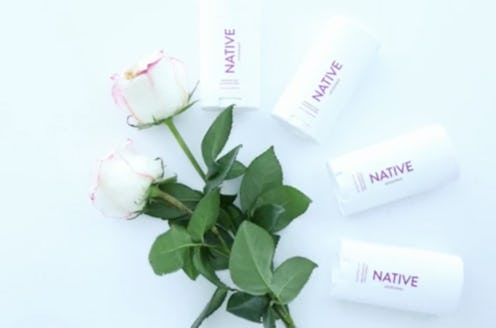Well, I guess it’s well and truly summer now, because rosé-scented deodorant is officially A Thing. It comes to us courtesy of natural deodorant company Native, and of course it’s going viral. Because, I mean… rosé deodorant. That is spectacular.
The Rosé scent is part of Native’s limited edition “Brunch Scents” package, which launched on Wednesday, according to TIME. The pack includes three full-sized (2.65 oz.) bars of deodorant, each themed after the kinds of cocktails one drinks during a particularly fabulous bottomless brunch: Mimosa, Sangria, and the aforementioned Rosé. I’ll admit that of those three, I’m having the most difficult time actually imagining what a rosé-scented bar actually smells like; mimosas and sangria are both grounded by fruit, so it’s not difficult to imagine a citrus-champagne scent getting labeled as Mimosa or something kind of fruit punch-like being dubbed Sangria, but rosé is much subtler than its two boozy cousins. Maybe it’ll smell like the kinds of notes the well-developed nose tends to pick up in rosé when you do that swirl-and-sniff thing during a wine tasting? Who knows. Based on Wine Folly’s guide to 10 different types of rosé, my money is on “fruity” or “fruity floral.”
For the curious, it looks like this:
Brunch Scents deodorant package, $30, Native.
In some respects the existence of rosé deodorant isn’t all that surprising; at this point, we’ve seen so many rosé flavored, scented, and otherwise themed products emerge from the great winey depths that my initial reaction to a deodorant scented like the summery pink drink was mostly just to shrug and say, “Of course.” The big question I have is why rosé got so popular in the first place. It’s obviously been around for ages — Vins de Provence notes that it’s been being made in some form since ancient times — but why did it suddenly boom in the 2010s, seemingly rising out of obscurity?
Alex Beggs over at Vanity Fair pegs the ‘80s as the reason pink wines fell out of favor for so long; that’s when white zinfandel, which resulted from a mishap in the zinfandel-making process at Sutter Home in 1975, first came to the fore. The thing about white zinfandel is that it’s quite sweet, so while it can make a good “gateway wine,” it might not be something you stick with as your tastes mature. That’s likely why white zinfandel, although enormously popular in the ‘80s, eventually developed a hard-to-shake reputation for being kind of tacky (not unlike many other things from the ‘80s).
So, what happened to bring it back into favor? Two words: The Hamptons. Paul Chevalier, Château d’Esclans’ wine director, told Beggs that it’s possible a lot of the well-to-do folks in the Hamptons may have tried rosé for the first time while traveling to locations like Cannes or St. Tropez; these rosés would not have been the sweet white zins of the ‘80s, so when smaller wineries in and around the Hamptons started to produce them as well, “meeting [them] again in Long Island was a welcome reunion.” It also helps that celebrity wineries, like Miraval (owned by Brad Pitt and Angelina Jolie) and Coppola (Francis Ford Coppola’s winery), have begun producing distinctive rosés.
In any event, rosé is now kind of like the IPA of wine: So easy to drink during the summer that you can just chill out with it all day, whether you’re on your back porch or at your favorite sidewalk café. From there, it’s almost to be expected that we’d become saturated with rosé: Rosé gummy bears, rosé popsicles, rosé beauty products, rosé clothing, the works.
Native, by the way, also looks to be a fascinating company. As a profile of the company published at Racked in December of 2016 notes, founder Moiz Ali quietly launched Native during the summer of 2015 “to little fanfare and with no marketing budget”; at the time of the profile’s publication, however, the company was “beating sales projections by 50 percent each month,” with fully half of its revenue coming from repeat customers. Natural deodorant can be tricky to get right (although for what it’s worth, there’s actually little to no evidence that the aluminum found in standard deodorants is actually harmful), but according to its reviews, Native seems to be on the right track. Notes Racked:
Those reviews, of which there are almost 2,000, average at just below five out of five stars. Customers seem to think the product is a savior, and often even evoke the Savior when talking about it. You can find comments like “This is not deodorant, this is a Jesus-scented magic stick which is amazing!” and “Thank you, Jesus, for bringing this product to me.” Comments like “I tried it for a few days and ended up stinking” (a not uncommon experience with natural deodorant) are few and far between.
You can buy Native deodorant online for $12 a bar; the Brunch Scents pack includes three bars for $30. Somewhat upsettingly, Brunch Scents is only listed in the women’s section — but, I mean, that doesn’t mean you can’t get it anyway, even if you don’t identify as a woman. Rosé for all!
